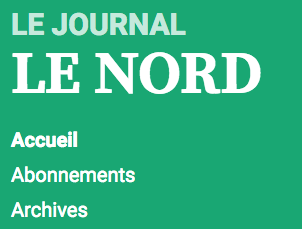The move is based on journalism practices in Swedish and Dutch media.
[[{“fid”:”5089″,”view_mode”:”default”,”fields”:{“format”:”default”,”field_file_image_alt_text[und][0][value]”:””,”field_file_image_title_text[und][0][value]”:””},”type”:”media”,”link_text”:null,”attributes”:{“title”:”The editor of Le Journal Le Nord, which serves 5,500 people in Hearst, Ont., has decided no longer to publish the names of accused of crimes. Screenshot by J-Source.”,”height”:526,”width”:1288,”style”:”width: 700px; height: 286px;”,”class”:”media-element file-default”}}]]
By Francis Siebert
On Sept. 24, 2015, I implemented a policy at Le Journal Le Nord stating that the paper would no longer publish the names, pictures and details of people accused of a crime or found guilty of a crime, as well as victims of crime.
My goal in implementing this policy was to minimize the negative impact crime stories have on the lives of individuals affected by the events that they cover without losing their appeal. More precisely, the goal was to protect the private lives of those individuals and to avoid hindering their rehabilitation.
I implemented the policy after I saw how bleeding really does lead. While I’ve often been told that “if it bleeds, it leads,” I only really realized how true the saying was after we began using a web analytics service for our website. The 10 most-read stories on our website all bleed: eight are crime stories and two are traffic accidents. Crime stories also have significantly more pageviews than non-crime stories. For example, a story about an attempted murder got over 3,000 pageviews while a profile of a local candidate in the 2015 federal election got 224 pageviews.
The problem with crime stories is that most are published entirely for entertainment and monetary purposes due to their high readership. Most do not “provide citizens with the information to be free and self-governing,” which Bill Kovach and Tom Rosenstiel write is the primary purpose of journalism in The Elements of Journalism. Crime stories often do not provide citizens with an accurate picture of crime in society; if anything, they create a false and exaggerated representation of it because there is an over-representation of crime stories in the media, and they almost always lack statistical context.
There is nothing wrong with entertainment journalism, per se. The problem with crime stories is that they can have detrimental impacts on the lives of those affected by the events that they cover.
I first learned of the practice of not naming names in media coverage through Maggie Jones Patterson and Romayne Smith Fullerton’s paper “Naming Names: Crime Coverage Rituals in North America, Sweden, and the Netherlands.” The arguments I put forward in the editorial I published explaining to readers why the paper would no longer name people in crime stories were primarily based on the practices of Swedish and Dutch media, where not publishing names in crime stories is the norm.
Canadians all have a right to privacy. People accused of crime also have the right to a fair trial and are presumed innocent until proven guilty. By publishing the names, photos and details of those people, the media practically condemn them before they are even tried in a court of law. It’s inevitabile. You just have to read the Internet comments to see the evidence. Comments such as, “This person should be locked up forever” and “This person is crazy” are not uncommon on stories about people merely accused of crime.
Publishing the names of people accused of crime is especially detrimental to those who are later found not guilty since the damage has already been done. But it’s also detrimental to people who are found guilty since most are given the opportunity to rehabilitate once their sentence is done. Rehabilitation is hard enough as it is, and having your name and picture everywhere in the media certainly doesn’t help. This is even truer for small community papers like Le Journal Le Nord, which covers news from Hearst, a town with a population of 5,500 in northern Ontario.
As for victims, they never ask to be victims. There is, therefore, no reason to shame those people in the media.
There will, however, be exceptions to this policy, primarily in cases where the police ask for help from the community to locate a criminal, the public is at risk, a victim asks to be named or a public figure commits a public crime, such as appropriation of public funds or political corruption.
The policy at Le Journal Le Nord has been in effect for two months now, and while I’ve received some positive feedback on it, most of it has been negative. I’ve been called a “second-class journalist,” among other things, and some people have even said they’ve stopped reading our paper.
The argument that has most often been put forward thus far in favour of publishing the names of people accused of crime is the need to know in order to “protect” themselves and loved ones, especially with crimes related to pedophilia. It is an interesting argument since if knowing the names of those people helps readers protect themselves, then such stories do “provide citizens with the information to be free and self-governing.” That being said, I’m not convinced that knowing the names of those people helps citizens protect themselves for it is the judicial system and the court’s job to punish criminals appropriately.
Either way, crime stories still lead without names, and I don’t intend to back down on my decision.
[[{“fid”:”5085″,”view_mode”:”default”,”fields”:{“format”:”default”,”field_file_image_alt_text[und][0][value]”:””,”field_file_image_title_text[und][0][value]”:””},”type”:”media”,”link_text”:null,”attributes”:{“height”:565,”width”:541,”style”:”width: 75px; height: 78px; margin-left: 5px; margin-right: 5px; float: left;”,”class”:”media-element file-default”}}]]Francis Siebert is the editor-in-chief of Le Journal Le Nord. His work has appeared in the Montreal Gazette, the London Free Press, The Interrobang and others. He has a master’s degree in journalism from Western University.

